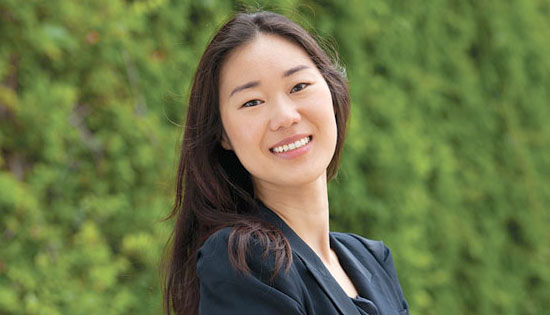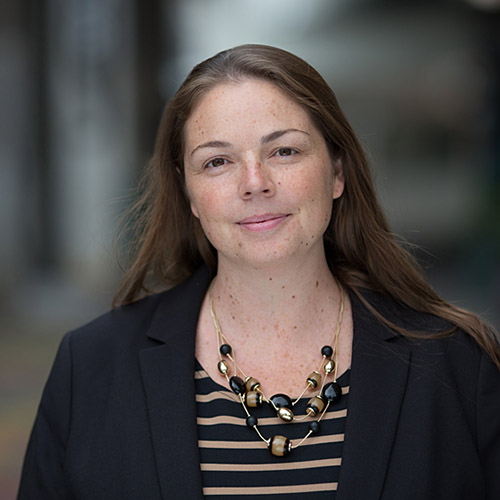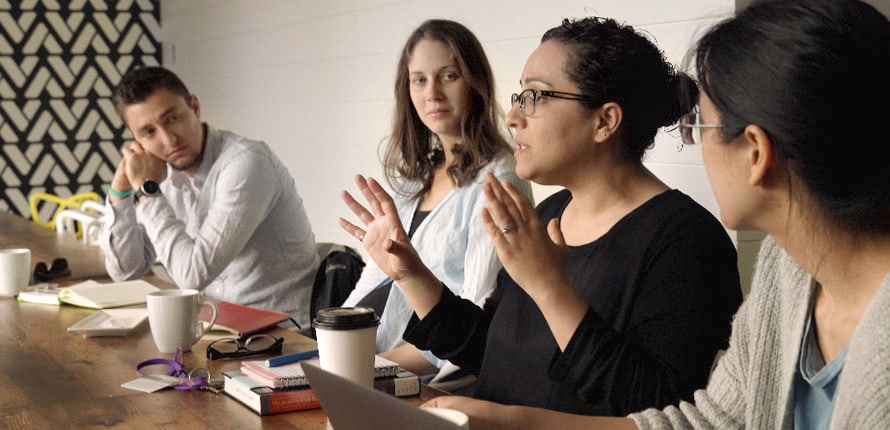Search for academic programs, residence, tours and events and more.
Society needs researchers who have a deep understanding of diversity, equity, and inclusion and who are prepared to address inequality and promote social justice.
Supported by world-class faculty, students undertake ground-breaking research that fosters social justice and promotes new understandings of social issues affecting individuals, families, organizations, and communities.

This offering reflects Western ways of knowing, though students are exposed to and encouraged to consider Indigenous ways of knowing and research, decolonization, and critical methods in their research. This offering is only open to full-time students and is available annually except when the Indigenized offering is implemented.
The program begins in May with an in-person orientation and development session over multiple days at the Faculty of Social Work in Kitchener, Ontario. Thereafter, all courses, seminars, and program meetings will take place over Zoom or a similar platform.
Full-time students receive minimum guaranteed funding and are eligible to apply for Ontario Graduate Scholarships, SSHRC or CIHR doctoral awards.
Program Orientation & Learning: In-person, multi-day gathering
Please note: The date for the next Indigenized Offering of the program is yet to be determined.
This offering is situated in Indigenous knowledges and embraces Indigenous teaching methods, such as circle, ceremony, and land-based learning. This offering is designed for First Nations, Métis, and Inuit peoples. It is open to full-time students and is usually offered every 4-5 years.
This offering is a critical part of the Faculty of Social Work’s commitment to indigenization and decolonization and responds to recommendations from the Truth and Reconciliation Commission. It also helps to respond to the growing demand for Indigenous scholars within higher education.
Courses are taught by Indigenous scholars from the Indigenous Field of Study (IFS). Course content privileges Indigenous scholarship and discourses relevant to Indigenous issues in practice, research and education. Indigegogy is a term that is employed by the IFS team to capture the Indigenous theories and practices that underpin the transformative Indigenous educational process. Indigegogy in each course is wholistic in design and flow from Indigenous ways of seeing, being, knowing, and doing. Course pedagogy involves the sharing circle in the presence of medicines, ceremony, and Elders, and land-based learning, when possible.
Graduates take their place in the circle of Indigenous knowledge, restoring and generating indigenous knowledge. Graduates understand "how" to gather knowledge, carve pathways, research, engage in Indigegogy, how to take their places within the academy or teaching and research positions and maintain their Indigeneity and Indigenist frameworks.
Our faculty members pursue a range of research interests across the micro-macro practice spectrum from the local to global contexts. They use various research methodologies, including critical, feminist, and Indigenous methods.
Our research centres, programs, and chairs include the Manulife Centre for Community Health Research, the Social Innovation Research Group, Walls to Bridges, Canada Research Chair (Tier II) in Global Adversity and Wellbeing, and the Lyle S. Hallman Chair in Child and Family Welfare.
Aligned with social work’s mission and values, faculty’s research addresses these core areas:
Faculty conduct research in partnership with marginalized and vulnerable communities and work toward social justice and social transformation. Faculty are deeply engaged with the community and engage is scholarship that is driven by community priorities, centres community voices, and advances social justice and inclusion.
This area includes Indigenous scholarship by Indigenous faculty members as well as research and knowledge mobilization related to decolonizing practices and relationships between Indigenous and non-Indigenous communities. Common to these topics is strong recognition, respect and value placed on Indigenous knowledge and ways of knowing, being and doing.
Faculty engage in research exploring the connections between various forms of adversity and, trauma, and wellbeing, with the goal of facilitating positive wellbeing, belonging, and inclusion. This work informs interventions at the micro and macro levels, including challenging systems of oppression that underpin various forms of adversity.
Faculty examine the ways gender and gendered experiences (i.e., expressions, identities, sexualities, and embodiment) are shaped by and intersect with factors such as racism, colonialism, patriarchy, cisgenderism, heterosexism, ableism, poverty, and religion. Faculty explore topics such as violence against women, criminal justice, immigration and refugee issues, disability, and 2SLGBTQ+ realities.

"The PhD program provided opportunities for me to build lifelong relationships with colleagues and friends. I am thankful for the care put into fostering these opportunities to connect and the mentors that helped guide my journey".
Christine Mayor (PhD ’22)
Take the first step in your graduate education and apply to one of our graduate programs. Follow our three-step admission process — we’ll walk you through how to apply and prepare for your first day as a graduate student.
We are excited to announce that we have transformed our PhD program from an on-campus one where students are required to take their courses at the Faculty of Social Work in Kitchener to a virtual one. This model involves a mandatory multiday in-person gathering in Kitchener at the start of one's studies followed by virtual synchronous delivery for all other components (coursework, comprehensive examination, dissertation).
Please read through the information in this section to learn more about admission requirements and deadlines for applying. The program now begins in May, and applications open in September.
Learn more about Laurier's Social Work PhD program by attending one of our upcoming virtual information sessions. These sessions cover:
Applications must be complete to be considered. The application includes assessments from referees and a statement of intent, which includes a proposed research plan, therefore we recommend you start developing your application early. Applications are assessed by faculty serving on the PhD program committee. We reserve the right to interview applicants and consider applications until the program is full.
After you have submitted your OUAC application, paid the non-refundable application fee, and Laurier has received your application, you'll receive an email from gradadmissions@wlu.ca advising you to upload the additional required documentation to Laurier’s Online Registration and Information System (LORIS).
An application for admission to our PhD in Social Work program must include:
As you complete the statement of intent keep the following points in mind:
Program application deadlines are firm. Late applications are not accepted. Spring 2026 applications will open as per the chart below.
| OUAC Application Open for Step 1 | OUAC Application Closes for Step 1 | Supplemental Documentation Due as per Step 2 | Target for Decisions on Applications as per Step 31 |
|---|---|---|---|
| Sept. 1 | Nov. 15 | Dec. 6 | Beginning of January |
1 Target dates are noted but are subject to external factors.
The Lyle S. Hallman Faculty of Social Work welcomes international students to the PhD Program. International students who have confirmed funding from a third-party, such as their employer or a scholarship program in their home country, will be considered for admission.
Learn more about admission requirements for international applicants.
Proficiency in written and spoken English is essential to graduate studies at Laurier. Applicants whose language of instruction during their previous postsecondary education was not in English must submit evidence of proficiency in English. If applicable, results from accepted testing services must be uploaded to LORIS.
If you are looking for more information about the program or want to discuss next steps, you can email FSWPhD@wlu.ca.
"The collegiality of peers, staff, and faculty was a valuable and cherished part of my experience. The physical spaces for students to work and engage with each other created a great extension to classroom learning. My advisor’s commitment guidance and support were essential in creating an intellectually stimulating experience that challenged me and deepened my critical thinking."
Bibi Baksh (PhD '22)
Full-time domestic students will benefit from bursary and teaching assistantship opportunities at the university.
All full-time domestic students receive the PhD minimum guaranteed funding (MGF) package of two teaching assistantships and a scholarship.
The Lyle S. Hallman Faculty of Social Work welcomes international students to the PhD Program. International students who have confirmed funding from a third-party, such as their employer or a scholarship program in their home country, will be considered for admission. Learn more about admission requirements for international applicants.

In addition to becoming faculty members, our graduates assume research, policy analysis, and leadership roles in human service organizations.
ASPIRE is Laurier's professional skills development training program for graduate students. The program helps you craft an individualized, extracurricular learning plan tailored to your professional journey and entry to the workplace.
If you are looking for more information about this program, have questions, or want to set up a meeting, contact a member of our team.
If you are looking for more information about the program or want to discuss next steps, you can email Cheryl-Anne Cait, associate dean at ccait@wlu.ca.
To contact other members of our team, or learn more about the interests of our faculty members, visit our contacts page.